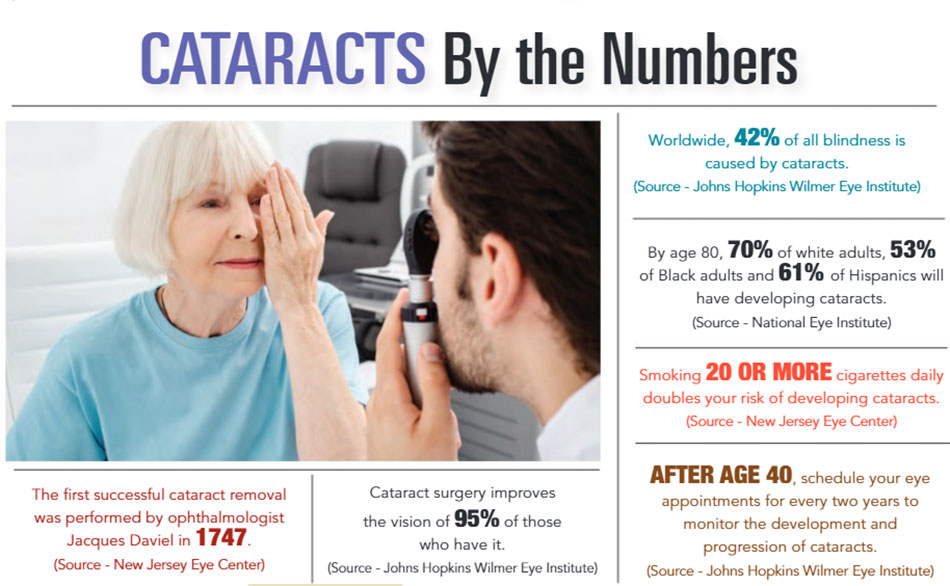Although it is easy to take our eyesight for granted, the reality is that, unlike good wine, vision does not improve with age. If you live long enough, your ability to see will be threatened by cloudy, yellowing spots that develop in the lenses of your eyes. Rare in children and young adults, cataracts can develop at any time, especially after age 60, and will progressively hinder your vision unless they are removed. Fortunately, today’s treatments are much kinder than those of the fifth century, when patients were subjected to blunt force trauma or eye gouging with sharp objects!
For many folks, a cheap set of reading glasses is the first alternative to holding books and magazines at arm’s length. When distance and night driving start to become problematic, the next step is a visit to the local ophthalmologist for new lenses for their eyes. The replacement lenses available today are a significant improvement over those invented in 1998. In 2008, multifocal lenses came to the market, and in 2018, new technology improved depth of focus and contrast for overall better vision.
In fact, today’s newest cataract surgeries include not only removal of damaged lenses but replacement with state-of-the-art ones that can significantly improve eyesight for close, medium range and distance vision. Made of acrylic materials or silicone, the artificial lenses are both indestructible and non-allergenic. These new products can address multiple eye problems. In some cases, for the first time, patients will be able to toss their glasses completely. Others will only need readers for up-close activities.
In the Lowcountry, ophthalmologist Kerry Solomon, M.D., works on the cutting edge of this new technology with Carolina Eyecare Physicians. As a respected research leader and ophthalmic surgeon, he was first in the nation to surgically implant Alcon’s Vivity® Extended Range of Vision Intraocular Lens.
According to Dr. Solomon, “The FDA-approved Vivity® Lens increases patient range of vision without the annoying ‘halo effect’ or glare that can encircle lights in the dark and make night driving more uncertain.”
The Vivity® is the latest advancement in artificial lens technology and has performed well in Dr. Solomon’s clinical studies.
While cautioning that not everyone is a candidate for this specific lens model, Dr. Solomon described cataract surgery as life-changing for the majority of his patients. After years of gradually deteriorating vision, the immediate improvement in clarity and color perception is a pleasant shock to his patients and a sense of personal satisfaction to Dr. Solomon.
In the Upstate, board-certified ophthalmologist Brian Johnson, M.D., has been performing cataract surgery with Clemson Eye since he returned to his home state in 2007. He averages 1,000 surgeries each year and, like Dr. Solomon, finds great personal reward in helping people improve their vision.
“The worse the cataracts are, the more the ‘wow’ factor. Watching my patients see the tremendous difference in their vision the next day after surgery is the most gratifying part of my job,” he shared.
Dr. Johnson also cautioned that while cataracts don’t actually damage the eye, people shouldn’t wait until their vision is severely impaired to make an appointment. This is especially true for those whose jobs might be adversely affected by vision loss, such as truck drivers and pilots.
While the COVID-19 pandemic did slow down patients who would normally have come in for routine services, Dr. Johnson’s office has been careful to identify specific patients for whom postponing services could be permanently detrimental and to see that they received all the eye care they needed.
The offices of Drs. Solomon and Johnson continue to practice social-distancing safety with enhanced cleaning protocols, fewer patients in the building at one time, sanitizers and masks. With increasing vaccinations, a sense of normalcy seems to be returning. For these doctors and their grateful patients, the view is improving once more.








